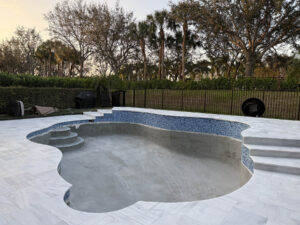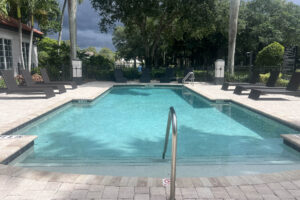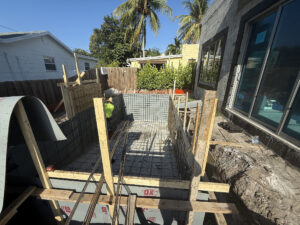A backyard pool in West Palm Beach is more than a luxury. It’s a lifestyle. But pool maintenance for first-time pool owners is often more involved than expected — keeping the water clean, balanced, and safe takes more than just an occasional skimming. Without proper pool maintenance, even a brand-new pool can quickly turn cloudy, develop algae, and strain your pumps and filters.
Understanding the difference between what can be managed at home and what requires a professional swimming pool cleaning service is key. From routine skimming and pool filter cleaning to more complex repairs, knowing when to do it yourself and when to call an expert can save time, money, and frustration.
This guide covers everything first-time pool owners need to know, including practical pool upkeep tips, key maintenance routines, and recognizing when to call a pool repair service.
By following these insights, you can enjoy clean and clear water, smooth-running equipment, and worry-free swims all year long in your new backyard pool, especially if you follow these first-time pool owner maintenance tips.
Learning Pool Maintenance Basics
If you’re looking for first-time pool owner maintenance tips, this section covers the daily and weekly habits that can help keep your pool clean and stress-free.
Owning a pool is about refreshing dips and enjoying summers surrounded by family. But for those new to pool ownership, understanding pool maintenance for first-time pool owners is key to keeping a balanced water system running smoothly.
The foundation of good pool maintenance is understanding the simple, consistent tasks that prevent bigger and more expensive problems later.
Here are the three pillars of pool upkeep every homeowner should master:
- Skimming
Removing leaves, bugs, and debris daily keeps the water inviting and prevents organic matter from sinking. Once it sinks, it can stain or feed algae growth.
- Empty Skimmer and Pump Baskets Regularly
Skimmer and pump baskets of the pool catch leaves and debris before they reach the filter. Emptying them regularly keeps the water flowing efficiently and prevents undue strain on the pump.
- Add Chlorine as Needed
Chlorine keeps the pool free from bacteria and algae. Adding tablets or liquid while the pump is running ensures even distribution and basic sanitation, which is a critical part of pool maintenance for first-time pool owners in West Palm Beach. For safe handling of chlorine and best practices for pool hygiene, check out this CDC guide to staying healthy in swimming pools.
In South FL, where rain, heat, and humidity are part of daily life, sticking to these basics is non-negotiable. Skipping these basic steps can tip the balance of the pool water, turning it from clear blue to cloudy or green in just a few days.
The Core Swimming Pool Systems You Must Understand
Once you’re comfortable with the daily and weekly basics, it’s time to get familiar with the systems that keep your pool safe, clear, and inviting. It’s all about learning how your pool really works behind the scenes. These first-time pool owner maintenance tips will give you the confidence to manage your pool and spot small issues early.
Once you appreciate how the various equipment keeps your pool clean and usable, you will be ready to step up to advanced pool maintenance.
Maintaining the Ideal Water Chemistry
Keeping water chemistry balanced is the single most important part of pool care. In fact, the end goal of every pool maintenance exercise is to maintain the desired water chemistry. Naturally, you must know the ideal pool water chemistry to be able to maintain a pool.
The sweet spot for pool water pH is 7.2–7.6. In this pH range, chlorine is most effective, and swimmers stay most comfortable. Free chlorine in water should stay within the 1 and 3 ppm range to sanitize the pool without causing eye or skin irritations.
Over time, chemicals, rain, and debris can push the water’s pH up or down. Acidic pH can corrode metal parts like fittings, pumps, ladders, and heaters. Basic pH levels can lead to scaling due to calcium buildup on pool surfaces and electrical parts.
Maintaining a stable pH level is essential to your pool’s health and durability. It ensures that chlorine can work efficiently, your pool equipment performs properly, and the pool remains safe.
Keeping the Circulation in Top Form
Water chemistry is the foundation of any clean swimming pool. The pump ensures that the clean water circulates well and doesn’t stagnate. Running a pump each day ensures that all the water moves through the filters and distributes disinfectants evenly.
Without proper circulation, even the cleanest water will become cloudy or green. In humid climates like Florida, most pools need 8-12 hours of circulation daily. The run time can vary with pump quality and efficiency.
Filters Lend Longevity to Your Pool
Disinfectants can kill bacteria and sanitize the water, but they cannot physically remove debris from the water. Your pool’s filter does that job.
The performance of a pool filter depends on several factors, including the filter’s surface area, water pressure, and the smallest particles it can capture, which is measured in microns (a millionth of a meter). So, a filter that traps particles of size 10 microns and above will collect more material than the one that traps particles of 40 microns and above.
There are three types of pool filters available in the market:
- Sand Filters: These can filter debris of approximately 20 to 40 microns. Although sand filters do not offer the finest filtration, they are the most durable and require low maintenance.
- Cartridge Filters: These filters can capture particles 10 to 15 microns in size. So, they offer better water clarity than sand filters. But cartridge filters need regular cleaning and replacement.
- Diatomaceous Earth (DE) Filters: These are the most efficient filters available in the market, with the ability to capture particles as small as 2 to 5 microns. They deliver the clearest water, but also require more upkeep using fresh DE powder and backwashing.
You can choose the right filter for your pool depending on your budget, ease of use, acceptable water clarity, and maintenance costs.
Extend the Swim Season with Heating Systems
For Florida homeowners, heating can make swimming a year-round activity. There are many heater options available for different types of users:
- Solar heaters
These offer the lowest operating costs, ideal in sunny climates. Naturally, they are less effective during cloudy weeks.
- Gas heaters
They heat the pool quickly and are a great option for occasional use. Given the rising cost of fuel, gas heaters are becoming more expensive to operate.
- Electric heat pumps
These heaters are the most efficient in climates like Florida. They are the perfect choice for maintaining a steady temperature for a longer time for your daily swims.
By understanding the basics of pool maintenance and the background systems that support them, you can troubleshoot minor issues, spot inefficiencies quickly, and make upgrades that fit your lifestyle needs. Once you grasp the basics, pool care shifts from confusing to second nature.
Since you can identify problems in their initial stages, you can call a professional before a minor problem becomes a major remodeling project.
Common Problems First-Time Pool Owners Don't See Coming
Small pool issues can escalate quickly if not noticed early. First-time pool owners, in particular, may not recognize subtle warning signs, leaving problems to grow unnoticed. That’s why practical first-time pool owner maintenance tips are essential for preventing costly repairs and downtime. So, what are some of the identifiers that can help you catch a problem in its nascent stage so that you can avoid expensive repairs?
Increasingly cloudy water
Pool waters often get cloudy due to poor circulation, clogged filters, or imbalanced chemicals. This dirty water not only makes the pool uninviting but also reduces the effectiveness of the disinfectants you have added to the water.
Green water, aka algae bloom
Florida’s humid weather and rain can dilute the chlorine in pool water, allowing algae to grow rapidly. Without prompt action like scrubbing and proper chemical treatment, the bloom can quickly get out of hand.
Noisy or overheated pump
A pool pump that hums loudly or gets heated quickly is a sign of blockages, electrical issues, or loose bearings. If the issue is not fixed quickly, it can escalate into expensive replacements.
Small leaks
Even minor leaks in plumbing around pool fixtures can get worse over time. This leads to water loss and can cause permanent structural damage.
First-time pool owners typically make the blunder of considering these problems minor, and learn the hard way that they can escalate quickly. Frequent checks to monitor water clarity, equipment, and water levels help catch these issues in the making. Knowing when a problem is beyond simple DIY fixes is key to maintaining a safe, clean, and enjoyable pool year-round.
Hidden Costs of Neglecting Pool Maintenance
Even a well-maintained pool can develop costly problems if minor issues are ignored. Small lapses in care can quickly escalate into expensive repairs, especially in West Palm Beach’s humid, storm-prone environment.
Surface Damage
Algae growth, buildup of calcium deposits, and stains left from organic waste can permanently discolor tiles and plaster. Over time, such neglected surfaces crack and require expensive resurfacing or replacement.
Equipment Strain
Clogged filters create an unhygienic pool environment. As a result, pumps have to work overtime, ultimately leading to poor water circulation. Such persistent strain can lead to pump burnout, heater corrosion, and chlorinator malfunction. Each equipment failure can result in expensive repair or replacement.
Chemical Imbalance
Poor water chemistry encourages algae blooms, cloudy water, and accelerated scaling. Frequent corrective treatments with strong algaecides and shock chemicals not only add to maintenance costs but also stress the equipment, leading to equipment failure.
Rising Energy Costs
An unkempt pool pushes equipment to work more and consume more electricity. This can significantly drive up utility bills.
Health Risks
Stagnant or unbalanced water fosters bacteria and mosquito growth. These disease carriers can lead to potential infections or irritations.
Property Depreciation
A poorly maintained pool is an eyesore. It can decrease a home’s resale value, as buyers notice algae, stains, cracks, or outdated equipment.
Investing in regular pool maintenance, whether DIY or through a professional pool cleaning service, preserves the pool’s longevity, ensures safety, and protects both your monthly budget and property value.
👉 Read more about these hidden costs in our detailed blog to see how proactive pool maintenance can save you thousands of dollars.
Seasonal Considerations for Pool Maintenance in West Palm Beach, FL
Homeowners can enjoy their pools in West Palm Beach all year long. While the pool can be used throughout the year, it is also important to update your pool maintenance schedule to keep up with the changing climate.
Hot, Humid Summers (June–September)
During the summers, the intense sunlight accelerates chlorine breakdown. The high humidity and frequent rainfall also dilute chemicals in the swimming pool. So, during the summer months, homeowners must monitor the water pH and disinfectant levels more closely. Without proper balance, algae growth can occur in just a few days.
Hurricane and Storm Season (May–October)
Hurricane season in West Palm Beach can take a heavy toll on your swimming pool. The strong winds and heavy rain can clog filters, destabilize pH, and damage pool equipment. You have to clean the pool and maintain a lower water level constantly.
After each storm, your pool requires shock treatments to stay safe for swimming.
Mild Winters (December–February)
Florida does not experience snowy or frigid cold winters typical of the north. You can spend the mild winters of West Palm Beach in your pool with equipment like heaters. Homeowners should ensure that the gas and electric connections are secure.
The climate in West Palm Beach can be unbearable during certain months. But your pool never goes out of season, and therefore, it is important to invest in regular maintenance all year long.
👉 Keep your pool perfect year-round. Check out our pool maintenance tips for the coastal weather of West Palm Beach, FL in our dedicated blog.
DIY vs Professional Pool Service: Which Is Better?
Maintaining a pool can be satisfying when done yourself, but there are limits to how much you can do with basic tools. Understanding the balance between DIY care and professional help ensures your pool stays clean, safe, and fully functional. Whether you’re managing things yourself or hiring a pool repair service, following these first-time pool owner maintenance tips ensures your pool stays clean and swim-ready in every season.
Pros of DIY Pool Care
- More cost-effective for routine tasks like skimming, brushing, and chlorine treatment
- Provides hands-on knowledge of your pool, helping you spot minor issues early
Cons of DIY Pool Care
- Mistakes in chemical handling or dosing can lead to imbalanced water, algae growth, or corrosion.
- Amateurs may miss equipment issues or early signs of mechanical failure, leading to costly repairs.
When to Contact a Professional Pool Cleaning Service?
- Pool Filter Cleaning & Replacement: Professionals ensure filters are cleaned thoroughly and replaced correctly. This improves the efficiency of circulation and the durability of the filter.
- Swimming Pool Pump Repair: Technicians can diagnose electrical or mechanical faults safely and repair them quickly.
- Major Leaks or Tile Cracks: Professional pool cleaners can spot small leaks and cracks in the swimming pool. Such early intervention prevents any major structural damage to the pool.
- Seasonal Deep Cleaning After Storms: Leaf litter, debris, and storm runoff require thorough cleaning beyond routine skimming, which only professional pool cleaners can do.
Homeowners in West Palm Beach tend to prefer a hybrid approach. They undertake regular but light pool maintenance themselves. But they also seek professional pool maintenance service to check on equipment, water quality, and buildup of any organic waste.
Here is a snapshot of how a professional pool service and cleaning compares to DIY maintenance:
| Aspect | DIY Maintenance | Professional Service |
|---|---|---|
| Cost: | Lower | Higher |
| Chemical Treatment Accuracy: | Moderate risk of error | Accurate & safe dosage |
| Equipment Handling: | Limited skill and knowledge | Expert diagnosis and pool repair |
| Time & Effort: | Requires personal time. In fact, it can take more time because you are learning as you go. | Saves the homeowner’s time. Service is completed within the prescribed time. |
| Problem Detection: | May miss early signs of trouble | Identifies issues proactively and solves them |
| Complex Repairs: | Not feasible | Safely handled |
👉 Curious about when to call in the experts? Read our full guide on the topic to know exactly when DIY isn’t enough.
Choosing the Right Pool Maintenance Service
Hiring a professional for pool repair service in West Palm Beach can save you a lot of time and effort. It is a practical way to upkeep your pool, which is exposed to hot summers, heavy rains, and even hurricanes. But not all pool maintenance professionals are created equal. So, take your time to analyze and select the best service for your needs.
Follow this checklist:
- Licensed & Insured – Verify that the company is fully licensed to operate in Florida. Also, ensure that their liability insurance covers personnel and property.
- Experience & Reputation – The company should be experienced in residential pool maintenance & repair. Check online reviews and ask for references, if available.
- Services Offered – An experienced vendor will provide comprehensive service packages that offer a range of services, including pool cleaning, inspections, chemical balancing, seasonal care, and more.
- Pricing and Value – Ask for the price of each of their services and ensure that you are getting a competitive price. Price should not be the only factor in selecting a service. The goal is to get the best value for your money.
Smart Pool Ownership Starts with Consistent Pool Maintenance
Owning a pool in West Palm Beach is an investment in your lifestyle and home.
With the region’s peculiar climactic conditions, keeping the pool safe, clean, and swim-ready throughout the year is essential. Regular pool maintenance protects against algae or bacterial infestation, equipment failure, and structural damage. By preventing such wear and tear, it also helps extend the life of your pool surfaces and associated systems. With regular care, you’re always ahead of potential problems.
Whether you handle weekly cleaning yourself or hire a licensed pool repair service, the goal is the same – a sparkling, healthy pool whenever you want to fancy a swim.
If you’re a first-time pool owner in West Palm Beach, Jupiter, or Palm Beach Gardens, our team is here to guide you through the process with expert service, along with a few essential first-time pool owner maintenance tips along the way. First-time pool owners can also explore beginner-friendly tips from the Pool & Hot Tub Alliance to stay on top of routine pool care.
A well-maintained pool not only preserves your investment but also gives you peace of mind and countless backyard memories with family and friends.
Reach out to a licensed pool professional at Finn’s Pool Services today. You can give us a call at 561-269-2391 for expert and personalized advice.
- Phone: (561) 566-9344
- Email: [email protected]
-
Address: 1335 Old Okeechobee Rd. #450
West Palm Beach, FL 33401 - Mon – Fri: 8:00 AM – 6:00 PM
- Sat & Sun: 9:30 AM – 4:00 PM



